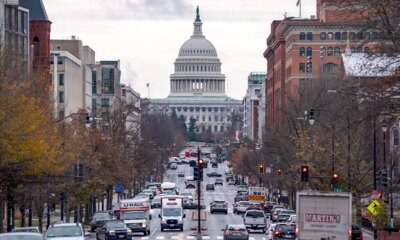Maine
Maine still relies heavily on fossil fuels but calls zero-carbon goals ‘achievable’

Maine energy officials on Friday offered a sober assessment of the state’s reliance on fossil fuels as they released a plan touting advances in electric heat pumps and electric vehicles and outlined ambitious goals for offshore wind, clean energy jobs and other features of a zero-carbon environment.
More than a year in the making, the Maine Energy Plan released by the Governor’s Energy Office boasted of the state’s “nation-leading adoption” of heat pumps and heat pump water heaters, helping to reduce the state’s dependence on heating oil, a goal set in state law in 2011. A technical report in the energy plan demonstrates that Maine’s goal of 100% clean electricity by 2040 is “achievable, beneficial and results in reduced energy costs across the economy,” it said.
More than 17,500 all-electric and plug-in hybrid electric vehicles, or 1.5% of the state’s 1.2 million registered light-duty vehicles, are traveling Maine roads, the most ever, the Governor’s Energy Office said. The state’s network of charging stations has expanded to more than 1,000 ports for public use.
“While the electrification shift will increase Maine’s overall electricity use over time, total energy costs will decrease as Maine people spend significantly less on costly fossil fuels and swap traditional combustion technologies for more efficient electric options,” the report said.
The Governor’s Energy Office spent $500,000 for the analysis and outreach to various groups that participated in meetings organized by a consulting group, said a spokeswoman for the state agency. Funding was from a 2019 agreement related to the New England Clean Energy Connect transmission project.
Maine remains the most dependent on home heating fuel in the U.S., the Governor’s Energy Office said, and more than half of electricity produced in New England is generated using natural gas. Maine spends more than $4.5 billion on imported fossil fuels each year, including gasoline and heating oil, with combustion contributing to climate change that’s causing more frequent and severe extreme storms, the report said. Last year was the warmest on record, it said.
Several winter storms last year and in 2023 caused more than $90 million in damage to public infrastructure and received federal disaster declarations, the report said.
Petroleum accounted for nearly 50% of energy consumed in the state in 2021, with electricity at 22.5%, wood at 16.3% and natural gas at nearly 11%, according to the state.
Maine has made progress reducing the share of households that rely on fuel oil for home heating, to 53% in 2023 from 70% in 2010. In contrast, electricity to heat homes has climbed to 13% of households from 5% in the same period.
The state still has some distance to cover to reach other goals. For example, the state has set a goal of 275,000 heat pumps installed by 2027.
The report said 143,857 heat pumps were installed between 2019 and 2024, increasing each year, according to Efficiency Maine Trust. And 54,405 heat pump water heaters were installed in the same six years.
Officials also have set a target of 30,000 clean energy jobs by 2030. Employers would have to double the existing number in less than eight years: A study in May 2024 said Maine’s “clean energy economy” accounted for 15,000 jobs at the end of 2022.
The report cites targets for more energy storage and distributed generation, which is power produced close to consumers such as rooftop solar power, fuel cells or small wind turbines.
Among the more ambitious targets that Maine has set for itself is to generate 3,000 megawatts of offshore wind by 2040, a big goal in the next 15 years for an industry that is only now beginning to take shape.
Two energy companies in October committed nearly $22 million in an offshore wind lease sale in the Gulf of Maine. The state’s offshore wind research project, also in the Gulf of Maine, is the subject of negotiations over costs among state regulators, the project’s developers and the Maine public advocate.
In addition, the federal government has turned down Maine’s application for $456 million to build an offshore wind port at Sears Island, complicating the state’s work as it looks to enter the offshore wind industry.

Maine
Maine’s leaders cannot turn the other cheek on gun violence | Opinion

Julie Smith of Readfield is a single parent whose son was in the Principles of Economics class at Brown University during the Dec. 13 shooting that resulted in the deaths of two students.
When classrooms become crime scenes, leadership is no longer measured by intentions or press statements. It is measured by outcomes—and by whether the people responsible for public safety are trusted and empowered to act without hesitation.
On December 13, 2025, a gunman opened fire during a review session for a Principles of Economics class at Brown University. Two students were murdered. Others were wounded. The campus was locked down as parents across the country waited for news no family should ever have to receive.
Maine was not watching from a distance.
My son, a recent graduate of a rural Maine high school, is a freshman at Brown. He was in that Principles of Economics class. He was not in the targeted study group—but students who sat beside him all semester were. These were not abstract victims. They were classmates and friends. Young people who should have been worried about finals, not hiding in lockdown, texting parents to say they were alive.
Despite the fact that the Brown shooting directly affected Maine families, Gov. Janet Mills offered no meaningful public acknowledgment of the tragedy. No recognition that Maine parents were among those grieving, afraid, and desperate for reassurance. In moments like these, acknowledgment matters. Silence is not neutral. It signals whose fear is seen—and whose is ignored. The violence at Brown is a Maine issue: our children are there. Our families are there. The fear, grief, and trauma do not stop at state lines.
The attack and what followed the attack deserve recognition. Law enforcement responded quickly, professionally, and courageously. Campus police, city officers, state police, and federal agents worked together to secure the campus and prevent further loss of life. Officers acted decisively because they understood their mission—and because they knew they would be supported for carrying it out.
That kind of coordination does not happen by accident. It depends on clear authority, mutual trust, and leadership that understands a basic truth: in moments of crisis, law enforcement must be free to work together immediately, without second-guessing.
Even when officers do everything right, the damage does not end when a campus is secured. Students return to classrooms changed—hyper-alert, distracted, scanning exits instead of absorbing ideas. Parents carry a constant, low-level dread, flinching at late-night calls and unknown numbers. Gun violence in schools does not just injure bodies; it fractures trust, rewires behavior, and leaves psychological scars that no statement or reassurance can undo.
That reality makes silence—and policy choices that undermine law enforcement—impossible to ignore.
After the Lewiston massacre in 2023, Governor Mills promised lessons would be learned—that warning signs would be taken seriously, mental-health systems strengthened, and public-safety coordination improved. Those promises mattered because Maine had already paid an unbearable price.
Instead of providing unequivocal support for law enforcement, the governor has taken actions that signal hesitation. Her decision to allow LD 1971 to become law is the latest example. The law introduces technical requirements that complicate inter-agency cooperation by emphasizing legal boundaries and procedural caution. Even when cooperation is technically “allowed,” the message to officers is unmistakable: slow down, worry about liability, protect yourself first.
In emergencies, that hesitation can cost lives. Hesitation by law enforcement in Providence could have cost my son his life. We cannot allow hesitation to become the precedent for Maine policies.
In 2025 alone, hundreds of gun-related incidents have occurred on K–12 and college campuses nationwide. This is not theoretical. This is the environment in which our children are expected to learn—and the reality Maine families carry with them wherever their children go.
My son worked his entire academic life—without wealth or legacy—for the chance to pursue higher education, believing it would allow him to return to Maine rather than leave it behind. Now he is asking a question no 18-year-old should have to ask: why come home to a state whose leaders hesitate to fully stand behind the people responsible for keeping him alive?
Maine’s leaders must decide whose side they are on when crisis strikes: the officers who run toward danger, or the politics that ask them to slow down first.
Parents are done with hollow promises. Students deserve leaders who show their support not with words—but with action.
Maine
Popular food truck grows into a ‘Maine-Mex’ restaurant in Bucksport

Cory LaForge always liked a particular restaurant space on Main Street in Bucksport, which recently housed My Buddy’s Place and the Friar’s Brewhouse Tap Room before that.
So much so that, when it became available two months ago, he decided to open his own restaurant there.
Salsa Shack Maine, which opened in early December, is a physical location for the food truck business he’s operated out of Ellsworth and Orland for the last two years. The new spot carrying tacos, burritos and quesadillas adds to a growing restaurant scene in Bucksport and is meant to be a welcoming community space.
“I just loved the feeling of having a smaller restaurant,” LaForge said. “It feels more intimate. This place is designed where you can have a good conversation or talk to your customers, like they’re not just another number on a ticket.”
After growing up in the midcoast, LaForge eventually moved west to work in restaurants at ski areas, where he was exposed to more cultural diversity and new types of food – including tacos.
“It’s like all these different flavors that we’re not exposed to in Maine, so it’s like, I feel like I’ve been living a lie my whole life,” he said. “It was fun to bring all those things that I learned back here.”
When he realized his goal of opening a food truck in 2023 after returning to Maine, LaForge found the trailer he’d purchased on Facebook Marketplace was too small to fit anything but tortillas – and the Salsa Shack was born.
It opened at the Ellsworth Harbor Park in 2023 and operated out of the Orland Community Center in the winter. What started as an experiment took off in popularity and has been busy ever since.
LaForge calls his style “Maine-Mex:” a mix of authentic street tacos in a build-your-own format with different salsas and protein. Speciality salsas include corn and black bean, roasted poblano, pineapple jalapeno and mango Tajin.
The larger kitchen space in the new restaurant has allowed a menu expansion to include quesadillas, burritos and burrito bowls in addition to the tacos, nachos and taco salad bowls sold from the food truck. Regular specials are also on the menu.

More new menu items are likely ahead, according to LaForge, along with a beer and wine license and expanded hours in the spring.
The food truck will live on for now, too; he’s signed up for a few events in the coming months.
Starting Jan. 6, the restaurant will also offer a buy-two-get-one-free “Taco Tuesday” promotion.
“It’s a really fun vibe here, and I feel like everyone finds it very comfortable and easy to come in and order,” LaForge said, comparing the restaurant’s atmosphere to the television show Cheers. “Even if you have to sit down and wait a little while, we always have some fun conversations going on.”
So far, the welcome has been warm locally, he said, both from residents and the other new restaurant owners who help each other out. LaForge’s sole employee, Connor MacLeod, is also a familiar face from MacLeod’s Restaurant, which closed in March after 45 years on Main Street.
When it shut its doors, people in town weren’t sure where they would go, according to LaForge. But four new establishments opened in 2025, offering a range from Thai food to diner offerings.
“It’s kind of fun to see so [many] culinary changes,” he said.
The Salsa Shack is currently open from 11 a.m. to 5 p.m. Tuesday through Saturday.
Maine
A new Maine tax will have you paying more for Netflix after Jan. 1

Maine consumers will soon see a new line on their monthly Netflix and Hulu bills. Starting Jan. 1, digital streaming services will be included in the state’s 5.5% sales tax.
The new charge — billed by the state as a way to level the playing field around how cable and satellite services and streaming services are taxed — is among a handful of tax changes coming in the new year.
The sales tax on adult-use cannabis will increase from 10% to 14%, also on Jan. 1. Taxes on cigarettes will increase $1.50 per pack — from $2 to $3.50 — on Jan. 5.
All three changes are part of the $320 million budget package lawmakers approved in June as an addition to the baseline $11.3 billion two-year budget passed in March.
Here are a few things to know about the streaming tax:
1. Why is this new tax taking effect?
Taxes on streaming services have been a long time coming in Maine. Former Republican Gov. Paul LePage proposed the idea in 2017, and it was pitched by Gov. Janet Mills, a Democrat, in 2020 and 2024. The idea was rejected all three times — until this year.
State officials said last spring the change creates fairness in the sales tax as streaming services become more popular and ubiquitous. It’s also expected to generate new revenue for the state.
2. What services are impacted?
Currently, music and movies that are purchased and downloaded from a website are subject to sales tax, but that same music and those same movies are not taxed when streamed online.
The new changes add sales tax to monthly subscriptions for movie, television and audio streaming services, including Netflix, Hulu, Disney Plus, Spotify and Pandora. Podcasts and ringtones or other sound recordings are also included.
3. How much is it likely to cost you?
The new tax would add less than $1 to a standard Netflix subscription without ads priced at $17.99 per month. An $89.99 Hulu live television subscription would increase by about $5 per month.
Beginning Jan. 1, providers will be required to state the amount of sales tax on customers’ receipts or state that their price includes Maine sales tax.
4. How much new revenue is this generating for the state?
The digital streaming tax is expected to bring in $5 million in new revenue in fiscal year 2026, which ends June 30. After that, it’s projected to bring in $12.5 million annually, with that figure expected to increase to $14.3 million by 2029.
The tax increase on cigarettes, which also includes an equivalent hike on other tobacco products, is expected to boost state revenues by about $75 million in the first year.
The cannabis sales tax increase, meanwhile, will be offset in part by a reduction in cannabis excise taxes, which are paid by cultivation facilities on transfers to manufacturers or retailers. The net increase in state revenue will be about $3.9 million in the first full year, the state projects.
-

 World1 week ago
World1 week agoHamas builds new terror regime in Gaza, recruiting teens amid problematic election
-

 Indianapolis, IN1 week ago
Indianapolis, IN1 week agoIndianapolis Colts playoffs: Updated elimination scenario, AFC standings, playoff picture for Week 17
-

 Business1 week ago
Business1 week agoGoogle is at last letting users swap out embarrassing Gmail addresses without losing their data
-

 Southeast1 week ago
Southeast1 week agoTwo attorneys vanish during Florida fishing trip as ‘heartbroken’ wife pleads for help finding them
-

 World1 week ago
World1 week agoSnoop Dogg, Lainey Wilson, Huntr/x and Andrea Bocelli Deliver Christmas-Themed Halftime Show for Netflix’s NFL Lions-Vikings Telecast
-

 Politics1 week ago
Politics1 week agoMost shocking examples of Chinese espionage uncovered by the US this year: ‘Just the tip of the iceberg’
-

 News1 week ago
News1 week agoRoads could remain slick, icy Saturday morning in Philadelphia area, tracking another storm on the way
-

 World1 week ago
World1 week agoPodcast: The 2025 EU-US relationship explained simply

















